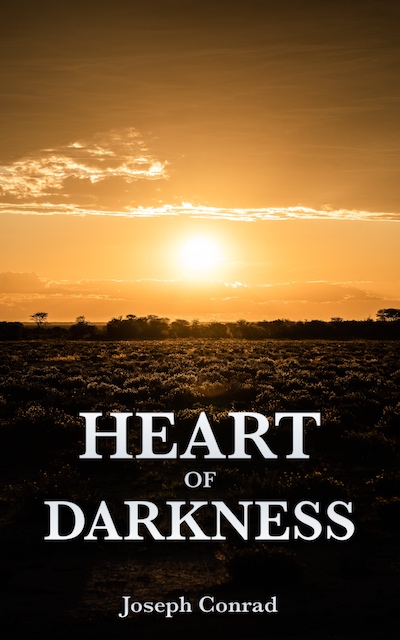Heart of Darkness

More than a century after its 1899 publication, Joseph Conrad's Heart of Darkness retains its haunting power as a literary masterpiece. The novella follows Charles Marlow, a steamboat captain, on a voyage up the Congo River to find the enigmatic ivory trader Mr. Kurtz. In the process, Marlow confronts the brutal reality of European colonialism in Africa and grapples with unsettling questions about the human capacity for evil. Heart of Darkness stands as a searing indictment of imperialism and a thought-provoking meditation on civilization, savagery, and moral corruption.
The story begins with Marlow recounting his journey to a group of men aboard a ship anchored on the River Thames in London. As Marlow describes his voyage deeper into the African interior, it becomes clear that the physical journey into an unknown wilderness mirrors a psychological descent into the dark recesses of the human soul. Marlow's mission is to retrieve Kurtz, an ivory trader who has become the de facto ruler of a remote outpost. Along the way, Marlow encounters the cruel and dehumanizing effects of colonialism: native Africans brutally exploited for labor, European traders driven mad by greed and power, and an atmosphere of pervasive moral decay.
When Marlow finally meets Kurtz, he finds a man broken in body and spirit, a once-great figure who has succumbed to illness and despair. Kurtz's dying words, "The horror! The horror!" encapsulate the book's central theme: a civilization that sees itself as enlightened and superior has spawned the horrors of imperialism and exposed the darkness lurking within the human heart. Through vivid, hallucinatory prose, Conrad creates an atmosphere of dreamlike intensity, immersing the reader in the oppressive heat and tangled wilderness of the Congo.
Conrad drew upon his own experiences as a merchant sailor to craft this novella. In 1890, he captained a steamboat on the Congo River and witnessed firsthand the atrocities of Belgian colonialism in what was then called the Congo Free State. These experiences left a profound impression on Conrad and informed the book's condemnation of imperial exploitation. Born in Poland in 1857, Conrad became a naturalized British citizen and is regarded as one of the greatest English-language novelists. Heart of Darkness exemplifies his mastery of character, theme, and language and stands alongside Lord Jim and Nostromo as one of his finest literary achievements.
While Heart of Darkness is rightfully acclaimed as a landmark work, it is not without controversy or criticism. The book's portrayal of native Africans as primitive and inhuman reflects the racism and prejudices of the colonial era. Nigerian novelist Chinua Achebe famously denounced Conrad as a "thoroughgoing racist" and argued that the book dehumanizes Africans even as it critiques European imperialism. Defenders of the novella argue that Conrad sought to expose the evils of colonialism and that the book's language reflects the attitudes of its flawed narrator and characters, not the author.
Despite these criticisms, Heart of Darkness endures as a masterful exploration of the human condition. The book's themes of moral ambiguity, the corrupting influence of power, and the capacity for evil within the human heart are timeless and universal. Conrad's haunting, dreamlike prose immerses readers in a world where the line between civilization and savagery, sanity and madness, becomes increasingly blurred. More than just a critique of colonialism, the book is a profound meditation on the nature of humanity itself.
In our own era of global inequality, political corruption, and environmental destruction, Heart of Darkness remains as relevant as ever. The book's portrayal of unchecked imperial greed and the devastating toll of colonialism continues to resonate. As Marlow's journey into the Congo reveals the darkness lurking within the human soul, it also forces us to confront the capacity for evil within ourselves and our society. Heart of Darkness is a challenging, unsettling work - and therein lies its enduring power as a literary classic.